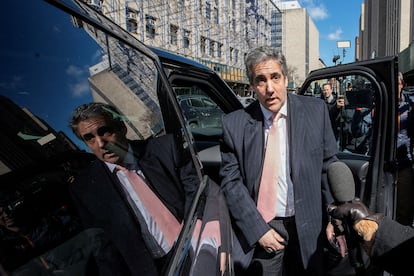The Trump Organization and former fixer Michael Cohen settle his lawsuit over unpaid legal bills
Cohen claimed in his lawsuit that the Trump Organization had promised to pay his legal expenses and did so for a time, footing more than $1.7 million in legal fees

Donald Trump’s company and his former longtime lawyer and fixer Michael Cohen have settled a lawsuit over Cohen’s claims that he was unfairly stuck with big legal bills after getting entangled in investigations into the former president.
Lawyers for the two sides disclosed the settlement during a video conference with the judge Friday, three days before Cohen’s 2019 lawsuit was slated to go to trial in a Manhattan state court. Details of the agreement were not made public.
Cohen said Friday the matter “has been resolved in a manner satisfactory to all parties,” and his attorney, Lauren Handelsman, said the terms were confidential. Messages seeking comment were left with lawyers for Trump’s company, the Trump Organization.
The legal fees lawsuit was one of the more obscure branches of the thicket of legal troubles surrounding Trump and his company. Still, the trial stood to give a platform to Cohen — an ardent Trump loyalist who became an outspoken antagonist — and to put the ex-president’s son Donald Trump Jr. on the witness stand.
Cohen claimed in his lawsuit that the Trump Organization had promised to pay his legal expenses and did so for a time, footing more than $1.7 million in legal fees.
But, Cohen said, the company reneged after he began cooperating with federal prosecutors in their investigations related to Trump’s business dealings in Russia and attempts to silence women with embarrassing stories about his personal life.
Cohen’s then-lawyers stopped representing him after the company stopped paying. His lawsuit said that harmed his ability to respond to the federal investigations.
In court papers, the Trump Organization has disputed that it made certain promises and has said it satisfied any obligations it did have. The company also has argued that Cohen’s involvement in the federal investigations wasn’t an outgrowth of his former job but rather a personal decision to try to reduce his own criminal legal exposure as an indictment loomed.
Jury selection in the case had begun Monday. Among the prospective jurors, more than half said they had strong opinions about Trump, the front-runner in the 2024 Republican presidential primary. Several said their feelings toward him were intense enough that they would not be able to fairly evaluate evidence.
While the former president would not have been a witness in the trial, Donald Trump Jr., who is a leader in the family business, was expected to testify.
Cohen pleaded guilty in 2018 to multiple charges, admitting that he lied to Congress, violated campaign finance laws through excessive political contributions, lied to multiple banks to obtain financing and evaded income taxes by failing to report more than $4 million in income. He was sentenced to three years in prison, although he served nearly two-thirds of it at home, released after the Covid-19 outbreak overwhelmed the nation’s prisons.
He then became a key witness in the New York grand jury proceeding that led to Trump’s April indictment on charges of falsifying Trump Organization records to protect his 2016 candidacy by suppressing claims that he had had extramarital sexual encounters.
Trump denied those encounters, and he pleaded not guilty to the criminal charges. He cast the case as a Democratic district attorney’s attempt to blunt his ongoing campaign to return to the White House.
Trump has now sued Cohen, accusing him of violating a company confidentiality agreement, breaching ethical standards for lawyers and maliciously “spreading falsehoods” about Trump. A Cohen spokesman, attorney Lanny Davis, has responded that Trump was abusing the legal system to harass Cohen.
While Friday’s settlement resolves the suit over Cohen’s legal expenses, a trial is set for October in New York Attorney General Letitia James’ business fraud lawsuit against Trump’s company and the businessman-turned-president himself.
Trump also faces a March trial date in the New York hush-money indictment; a trial set for May in Florida in the federal criminal case surrounding his handling of classified documents; and the second federal civil trial involving writer E. Jean Carroll’s claim that he defamed her in denying her sexual assault allegation.
He also disclosed this week that the Justice Department had told him he was a target of an investigation into efforts to unravel his loss in the 2020 presidential election — a notification that could signal forthcoming charges. Separately, prosecutors in Georgia plan to announce charging decisions within weeks in their inquiry into attempts by Trump and his allies to reverse the vote outcome there.
Trump has denied wrongdoing in all the matters and says prosecutors are ginning up charges to damage his ongoing presidential campaign.
Sign up for our weekly newsletter to get more English-language news coverage from EL PAÍS USA Edition
Tu suscripción se está usando en otro dispositivo
¿Quieres añadir otro usuario a tu suscripción?
Si continúas leyendo en este dispositivo, no se podrá leer en el otro.
FlechaTu suscripción se está usando en otro dispositivo y solo puedes acceder a EL PAÍS desde un dispositivo a la vez.
Si quieres compartir tu cuenta, cambia tu suscripción a la modalidad Premium, así podrás añadir otro usuario. Cada uno accederá con su propia cuenta de email, lo que os permitirá personalizar vuestra experiencia en EL PAÍS.
¿Tienes una suscripción de empresa? Accede aquí para contratar más cuentas.
En el caso de no saber quién está usando tu cuenta, te recomendamos cambiar tu contraseña aquí.
Si decides continuar compartiendo tu cuenta, este mensaje se mostrará en tu dispositivo y en el de la otra persona que está usando tu cuenta de forma indefinida, afectando a tu experiencia de lectura. Puedes consultar aquí los términos y condiciones de la suscripción digital.








































